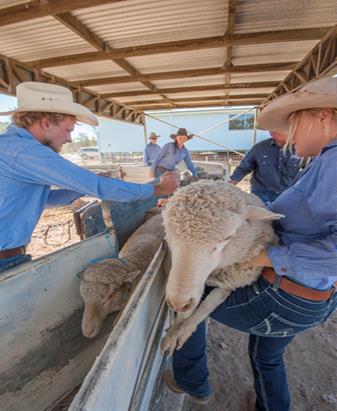Latest listings on Jobs Central recruitment page:
- Sales manager – New Zealand SCR (Allflex Group)
- Export Manager (Stella Foods Australia)
- Administration Manager – Aust Livestock Property Agents Assoc
- Production Manager & Abattoir Plant Manager – Darling River Meats
- Various 2018 season positions (Paraway Pastoral Co)
- Assistant Farm manager (Cunningham Cattle Co)
- Administration coordinator (Abberton’s HR client)
- Mount House Station – 2018 season
- Marketing and Communications Manager – Mort & Co
- Station manager – Millungera (Australian Cattle & Beef Holdings)
- Feedlot Operations Trainee positions – Mort & Co
- 2018 season staff – NT (The Walhallow Partnership)
- Click here to access these and other exciting meat and livestock supply chain positions currently listed on Jobs Central.

A RESURGENCE in student enrolments in the agricultural sciences at universities across Australia has exposed the need for stronger linkages to be built between universities and the agricultural industry.
The revival of interest in agricultural career paths has been welcomed by the rural sector, but has also increased demands on the sector to become more involved and integrated with university courses, such as offering work experience opportunities for potential graduates.
Speaking at the Australian Agriculture Roundtable Conference in Sydney, Rimfire Resources managing director Mick Hay said the increase in student numbers in ag-related courses had prompted a concerted effort between industry and the university system to build better linkages.

Mick Hay
“One of the common things we hear a lot from graduates is they have a poor understanding of what is happening in the industry, who the key players are and how their specific degree links with particular jobs,” he said.
“But more recently, industry and students themselves have given a lot of feedback to the university system. To the universities’ credit, they have taken that on board. All the universities have lifted their engagement with industry.”
Mr Hay said a lot of universities had brought back a component of practical experience and practical work into their courses, making it a required part of university degrees, mainly in a student’s second-last or final year.
“That is great, but it has also created an issue in the industry. Because agriculture is flavour of the month, there has been a huge increase in enrolments in most courses, some up to three and four times what they were five years ago,” he said.
“That is fantastic, but what it has meant is that there is a huge requirement on industry to do their part and assist these students with their work experience and practical work.
“Industry wanted it for a long time and now the universities have listened and built it into their courses, so now it is up to industry to do their bit.”
Practical work experience
Mr Hay said many courses now offered students the opportunity for up to 12 weeks practical work experience across a range of disciplines.
He said this could take a range of forms, including on-farm production, working in a grain-trading house, working in a laboratory – depending on what discipline the students were studying.
“The issue is more about the fact that four or five years ago we might have had 100 to 150 kids nationally who had that requirement,” he said.
“But with the ramping up of numbers, next year our intakes just for agribusiness and the agricultural sciences will be up around 1600 students. If, give or take, 70 percent of students that start a degree finish it, potentially we will have 800 to 1000 people in third or fourth year, with a lot of them requiring industry to assist them gain practical work experience.”
Mr Hay said overlaying the need for offering the opportunity for hands-on, practical experience, there was also the need to accommodate a changing skill set.
“We have a whole requirement around IT/agtech/precision agriculture that is coming in as well. How does that look on the work experience front?” he said.
Mr Hay provided the conference with examples of two specific internship programs which he suggested could be used as templates for other rural sectors to adopt.
- AgriFutures (formerly RIRDC), through its program partners, offers a fully-funded scholarship for which students can apply in their first year. Successful applicants are sponsored through their university studies. They are given a university mentor. Whichever industry group they have applied through and got funding from will place them with work experience in that industry sector. Ideally, they will end up in that industry sector with a job.
- Rimfire Resources, through its GradLink program, is heavily involved in a program run by Hort Innovation in the horticulture industry. Final year students are given an $8000 scholarship which the host company partly pays and the rest is co-funded by Hort Innovation. Students do their 12 weeks’ practical work. Their first-year employment is also co-funded between Hort Innovation and the host employer.
“So, we are now seeing some programs evolve where there is co-investment between industry and the host to try to attract and develop new talent into an industry sector. We have had a lot of interest in that. Everyone is sitting back and watching how it goes,” Mr Hay said.
“The programs are twofold. They are engaging everyone in the agri sector, but also target those who aren’t in the sector at this point but may be attracted to come into the sector. We are looking at a broader skill set.”
How did Italian visitor Mike get on?
Several readers have asked us how visiting Italian holiday visa-holder Mike Lai got on, in his quest for short-term farm or butchery work in Australia via Beef Central’s recruitment page.
After Mike contacted us with his unusual request last week, we gave him a free run on Beef Central’s recruitment listings as a ‘position wanted.’ To refresh readers’ memories, here’s what we posted:
OS visitor seeking short-term livestock or butchery work
Mike Lai is a 29-year-old Italian visiting Australia on a working holiday visa. He is looking for farm work (three months or preferably longer) with free-range cattle or lambs, or would also consider butchery work anywhere in eastern Australia. He is a fourth-generation butcher/farmer with more than seven years in the butchery trade, growing up between farm work and artisan butchery shops and restaurants in Italy and the UK. He speaks good English and has a driver’s license.
Mike contacted us a day after the ad appeared, saying he was on a flight to Townsville to start in his new retail butchery/livestock handling adventure with the popular Otto’s Fresh Food market at Currajong.
He was bowled over with offers, so much so that we took the ad down to stop his phone ringing. Editor.

HAVE YOUR SAY